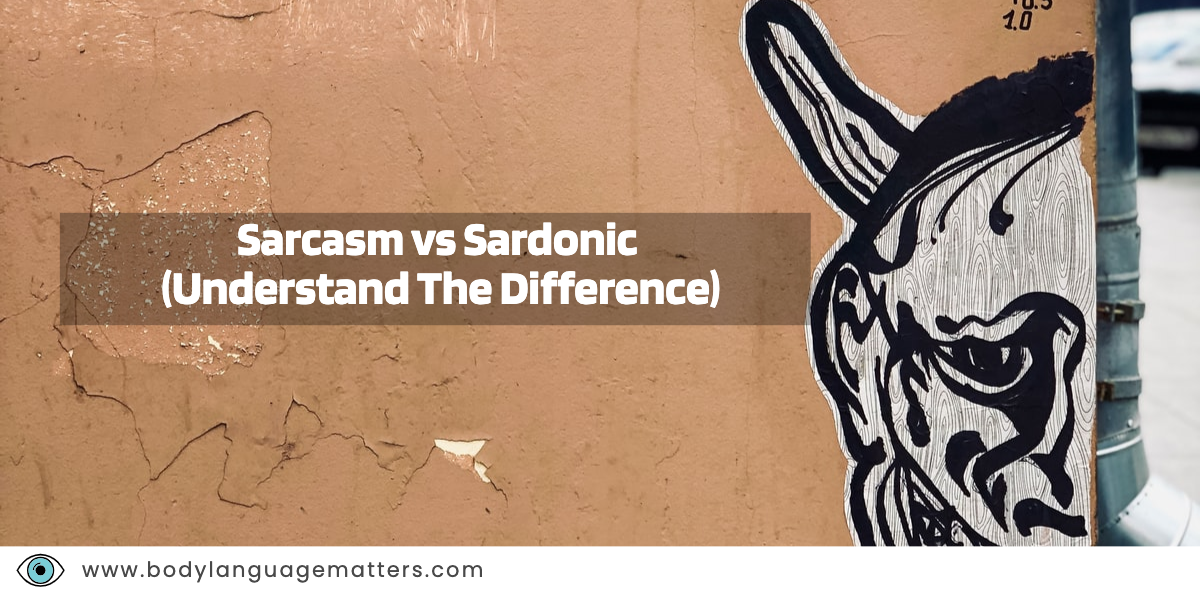Sarcasm and sardonicism are often used interchangeably, but there is a subtle difference between the two.
Sarcasm is a form of irony that is used to mock or belittle its cutting, smart-mouthed use to put someone down. Sarcasm can be used in a variety of ways to bring home a point or to make people laugh. Some comedians like Anthony Jeselnik and Norm Macdonald use sarcasm in their acts to get the audience laughing.
There is no better way to convey ridicule and contempt than sarcasm. The implication is that the target of the sarcasm deserves to be treated with the disrespect shown in their words.
Sardonicism, on the other hand, is a more cynical form of humor that is used to make fun of someone or something. Both sarcasm and sardonicism can be used in a positive or negative way.
Sardonicism is a form of humor that is used to make fun of someone or something. They can be used in a positive or negative way. For example, when someone is being rude and someone else laughs at them, this could be considered a form of sardonicism. This form of humor can come across as aggressive and mean-spirited if they are not used correctly. It’s also draw, close and to the point.
- How Do We Use Sarcasm and in what context?
- How Do We Use sardonicism and in what context?
- Questions And Answers.
- 1. What’s the difference between sarcasm and sardonic?
- 2. Which one is more effective in communication?
- 3. Which one is more likely to offend someone?
- 4. Can you use both sarcasm and sardonicism in the same sentence?
- 5. What are some examples of sarcasm and sardonicism?
- 6. What is the difference between sarcastic and sardonic?
- 7. What is an example of being sardonic?
- 8. What is a sardonic wit?
- Summary
How Do We Use Sarcasm and in what context?
We use sarcasm in our everyday lives to convey humor. In the context of everyday life, sarcasm is used to make a joke or poke fun at someone. If a friend told you they just spent the day at the beach and you said “that sounds like fun,” that would be an example of sarcasm.
Sarcasm is saying something unexpected and not expecting a result of it.
How Do We Use sardonicism and in what context?
Sardonicism is a form of cynicism. It’s ironic and mocking, but without humour. Sardonicism is often used to criticize or ridicule someone or something. People who are sardonic are making fun and mocking in a disdainful or cynical way.
Questions And Answers.
1. What’s the difference between sarcasm and sardonic?
The two words are often used interchangeably to describe a cynical or mocking comment, but there is a subtle difference. Sarcasm is more often used to describe comments that are meant to be funny or ironic, while sardonic comments are more often used to describe comments that are meant to be hurtful or unkind.
2. Which one is more effective in communication?
There is no definitive answer to this question it really depends on the context and what you are trying to get across.
3. Which one is more likely to offend someone?
In general, sardonicism is the more offence of the two, swear words or language that is graphic or sexually explicit is more likely to offend someone than simply using derogatory terms to describe a person or group.
4. Can you use both sarcasm and sardonicism in the same sentence?
Yes, you can use both sarcasm and sardonicism in the same sentence. For example, “I’m so glad that you’re happy with your new job – sarcasm/sardonicism.” It depends on the delivery and tone of voice.
5. What are some examples of sarcasm and sardonicism?
Some examples of sarcasm and sardonicism are when someone says something that is the opposite of what they really mean in order to mock or insult someone, or when someone speaks in a dry, mocking, or bitter tone.
6. What is the difference between sarcastic and sardonic?
The difference between sarcastic and sardonic is that sarcastic comments are made with the intention of being funny or humorous, while sardonic comments are made with the intention of being cynical or mocking.
7. What is an example of being sardonic?
An example of sardonicism would be if someone were to make a joke about a sensitive or serious topic the comment is designed to hurt you.
8. What is a sardonic wit?
A sardonic wit is someone who is clever and quick with their words and often uses sarcasm to make fun of people or situations.
Summary
Sarcasm is used to ridicule or make fun of someone or something, usually with the intention of being humorous. Sardonicism, on the other hand, is used to mock or scorn someone or something. While both sarcasm and sardonicism can be used to make fun of someone or something, sardonicism is generally more biting and caustic.

